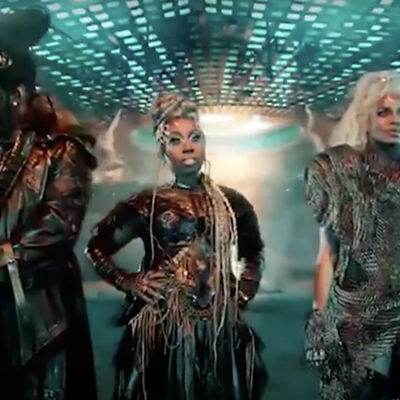Snakes! Guillotines! Electric Chairs! My Adventures in the Alice Cooper Group
By Dennis Dunaway and Chris Hodenfield
Thomas Dunne Books, 304 pp., $26.99
It was 1972, and Alice Cooper (the band, not just the singer) had finally made it. After years of struggle in which their bizarre music, over-the-top stage antics, and costumes (which had morphed from gender bending to horror movie stylings) had some audiences fighting to exit shows first, they had reached a level of popular appeal. They had a show at the Hollywood Bowl, riding high on their hit single, “School’s Out.”
Always looking to squeeze any extra publicity, the band and manager Shep Gordon (himself the subject of the recent fascinating documentary Supermensch), devised the idea to drop thousands of paper women’s panties on the crowd from a helicopter, the same panties in which their current LP had come wrapped inside the sleeve. When bassist Dennis Dunaway didn’t see a blanket of undergarments from the stage he figured that something had gone awry.
It had.
Because of strong winds and the rotating helicopters blades, most of the panties ended up blown away and scattered over the nearby neighborhood, littering the roofs of quiet suburban homes. Needless to say, the move even more publicity than originally intended. This, and scores of more stories unravel from Dunaway’s time with the original Alice Cooper group. From their start as the Beatles parody group “The Earwigs” (put together for a one-off high-school talent contest), changing names (The Spiders, Nazz), an apprenticeship with Frank Zappa, to worldwide fame and notoriety, this book recounts those days in lively detail.
And while some stories have appeared before in other books, there are plenty of new ones, and new details from familiar ones. Like the famous chicken incident. At the huge outdoor Toronto Rock and Roll Revival in 1969, the repeated story (including from Cooper himself) and rock legend has been that an audience member threw a live chicken onstage. Cooper — thinking the bird could fly — threw it back into the frenzied audience, which ripped it to bloody shreds and caused howls of protest, including from animal rights groups.
Here Dunaway reveals that the chicken was actually the band’s, one of several that would take residence on top of speaker amplifiers during a show. Also, Cooper’s famous “spider eyes” makeup was inspired by a photograph of a clown that Dunaway found and showed to his lead singer, who soon adopted the look that he’s kept to this day.
There are also lots of tales of the group in the early days of gigging in L.A. and rubbing shoulders with rock elite like the Doors (who became buddies), Pink Floyd (who crashed at their house on their first American tour), the Yardbirds, Janis Joplin, and Jimi Hendrix. However, Dunaway does have somewhat of a legitimate axe to grind, a theme that runs through the entire narrative.
The band decided on “Alice Cooper” as a collective name for all five members. Eventually, singer Vincent Furnier (yes, that’s his real name) became the embodiment of the character, Alice Cooper, which also became his stage name. The subtle differences were lost on most fans, music journalists, and the media (to which Cooper gave the bulk of interviews). Soon, the name became synonymous with the singer. Which made it all the more easier to single him out and set the stage for his solo career, with Gordon seemingly plotting all along to jettison the group.
It left very bitter feelings for Dunaway, guitarists Michael Bruce and Glen Buxton (the troubled latter axeman died in 1997), and drummer Neal Smith. Cooper, of course, had his own alarming ride with substance abuse and near-death experiences, as detailed in the recent documentary Super Duper Alice Cooper. However, Dunaway has made some kind of peace with that history. He still considers Cooper one of his closest friends, and has kept a music career going — most recently with his group Blue Coupe. And when “Alice Cooper” was inducted into the Rock and Roll Hall of Fame in 2011, it was for all the members, with the four surviving ones giving one of their now semi-occasional reunion performances.
Songs that the original Alice Cooper created like “School’s Out,” “I’m Eighteen,” “Billion Dollar Babies,” “No More Mr. Nice Guy,” and “Under My Wheels” are now classic rock staples. And its creators unlikely to provoke the parental outrage and disgust of their ‘70s heyday. At the recent Cooper show in Houston — complete with dead babies, mock executions, and ghoulish sets — one could see plenty of teens and even preteens, some with the trademark makeup. And, of course, the band’s visual and sonic influence is easily traced to latter groups like KISS, Rob Zombie, Marilyn Manson, and Motley Crue. That last band has Cooper as the opening act on their current “farewell” tour, and it's likely that Cooper will “kill” all four Cruesters via guillotine at the final show on December 31 of this year.
Nevertheless, Dunaway’s memoir is one of the most fun and enjoyable in recent memory. And it’s a fine companion to the books previously written by Cooper (long out-of-print Me, Alice and more recent Golf Monster) and Bruce (the hard-to-find No More Mr. Nice Guy) about the original Shock Rockers.
Support Us
Houston's independent source of
local news and culture
account
- Welcome,
Insider - Login
- My Account
- My Newsletters
- Contribute
- Contact Us
- Sign out
[
{
"name": "Related Stories / Support Us Combo",
"component": "11591218",
"insertPoint": "4",
"requiredCountToDisplay": "4"
},{
"name": "Air - Billboard - Inline Content",
"component": "11591214",
"insertPoint": "2/3",
"requiredCountToDisplay": "7"
},{
"name": "R1 - Beta - Mobile Only",
"component": "12287027",
"insertPoint": "8",
"requiredCountToDisplay": "8"
},{
"name": "Air - MediumRectangle - Inline Content - Mobile Display Size 2",
"component": "11591215",
"insertPoint": "12",
"requiredCountToDisplay": "12"
},{
"name": "Air - MediumRectangle - Inline Content - Mobile Display Size 2",
"component": "11591215",
"insertPoint": "4th",
"startingPoint": "16",
"requiredCountToDisplay": "12"
}
,{
"name": "RevContent - In Article",
"component": "12527128",
"insertPoint": "3/5",
"requiredCountToDisplay": "5"
}
]
KEEP THE HOUSTON PRESS FREE...
Since we started the Houston Press, it has been defined as the free, independent voice of Houston, and we'd like to keep it that way. With local media under siege, it's more important than ever for us to rally support behind funding our local journalism. You can help by participating in our "I Support" program, allowing us to keep offering readers access to our incisive coverage of local news, food and culture with no paywalls.
Bob Ruggiero has been writing about music, books, visual arts and entertainment for the Houston Press since 1997, with an emphasis on classic rock. He used to have an incredible and luxurious mullet in college as well. He is the author of the band biography Slippin’ Out of Darkness: The Story of WAR.
Contact:
Bob Ruggiero
Trending Music
- Top 10 Butt-Rock Bands of All Time
- The Marías Go Deep in Concert
- Chris Brown's 11:11 Tour Fills the Toyota Center
-
Sponsored Content From: [%sponsoredBy%]
[%title%]

Don't Miss Out
SIGN UP for the latest
Music
news, free stuff and more!
Become a member to support the independent voice of Houston
and help keep the future of the Houston Press FREE
Use of this website constitutes acceptance of our
terms of use,
our cookies policy, and our
privacy policy
The Houston Press may earn a portion of sales from products & services purchased through links on our site from our
affiliate partners.
©2024
Houston Press, LP. All rights reserved.





